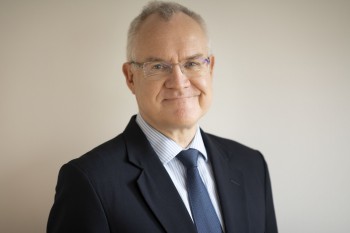Events
Focusing on Circular Economy, Let’s Lead the Future Together
- Finland and Japan celebrated the100th anniversary of the establishment of diplomatic relations in 2019. What kind of relationship do you expect from now on as the Ambassador to Japan?
I truly foresee our bilateral relationship deepening. I base this review on facts. Finland and Japan are surprisingly similar nations in certain aspects, which allows us to have mutual dialogue, learn from each other and seek solutions to common challenges. The grand challenges of the future, such as climate change and our ageing societies, are issues, which both nations, and indeed many others across the globe, have to contend with. Digitalisation is an area where Japan is planning a giant leap in the near future and Finland has a great story to tell – and we are eager to work with our Japanese friends to smooth their way. Digitalisation can also be a tool with which we mitigate the impact of ageing society, address societal changes and propel innovations and development. But beyond bilateral relations countries such as Finland and Japan should join forces in trying to shape the future on a more grand scale. We need to be able to move from words into deeds if we are to halt and turn the tide on climate change. Circular economy and sustainable solutions are such deeds that I foresee us focusing on together.
- Finland is presenting its candidacy to a seat on the United Nations Human Rights Council for the 2022–24 term. Would you tell the expectation of the next term activity?
Human rights are today under pressure by the COVID-19 pandemic, the rise of autocratic states, and new human rights problems. The work conducted at the United Nations Human Rights Council, the foremost international body tasked with human rights promotion and protection, is therefore of increasing relevance. Our UNHRC campaign’s crosscutting theme is the rights of women and girls. Equality is a cornerstone on which the whole success of the Finnish society is based upon. Therefore, we want to work to build a world where women and girls of all abilities and ages can fully enjoy their rights. Speaking again about digitalisation, we also want to ensure that new technologies and digitalisation will help enhance equality and human rights for all, online and offline. And while more immediate crises often draw at our attention, the major crisis we all face is climate change and this also has an impact on human rights especially in developing nations. We want to step up joint efforts to identify and address the impacts of climate change on human rights.
- What is the World Circular Economy Forum (WCEF) which addresses environmental issues on a global scale, started in Helsinki in 2017?
The World Circular Economy forum is now an annual event that brings together decision makers, experts and business leaders to discuss the best current circular economy solutions to benefit all. We think that the genuinely competitive innovative solutions are born out of the meeting of business and environmental views. I am proud to say the initiative in 2017 came from Finland and the second ever forum was held the following year in Yokohama, Japan. WCEF2021 will be held in Toronto, Canada from 13 to 15 September 2021.
- Would you tell us what is the appeal of Finland, which has been ranked No. 1 in the UN World Happiness Rankings (2021) for the fourth year in a row?
Ah, where to start! Finland has indeed attracted a lot of international attention for topping the United Nations World Happiness Report for a few years in a row. This has also allowed us to shed light on the multiple factors behind “the happiest country in the world”: social cohesion, high level of trust, good governance, trail blazer of gender equality, world-class education system, clean abundant nature, free independent media and so on. Perhaps out of all of these trust is the least well known ingredient of the Finnish happiness success story. Finland is traditionally seen as a country with a high level of trust. Trust keeps the society together and is the backbone of a good and effective public administration. The success of Finland and the other Nordic countries in trust comparisons has been explained by long democratic traditions, economic equality and low corruption levels. But in order for the society to generate wellbeing for all of its members, trust needs to be paired with a strong sense of responsibility. Public services are not seen as a substitute for individual effort, but as a way of ensuring that everyone gets a fair chance. Finnish society is built on democracy and a wide range of public services, including public healthcare and free education. Despite relatively high levels of taxation, these services remain popular, largely because there is very little corruption and because Finns trust that their taxes are used fairly and for the common good. I think all of these factors combined mean we are a trusted, reliable and stable partner in international relations and business, too.
